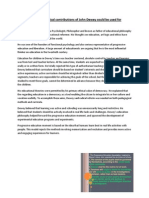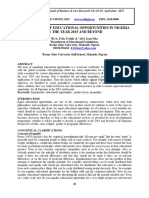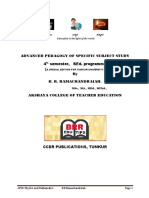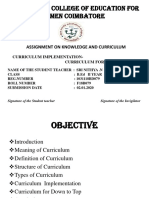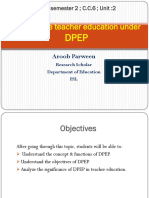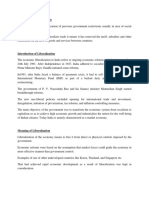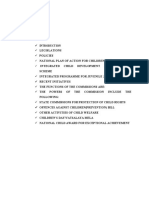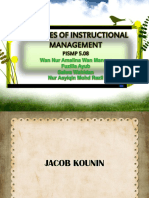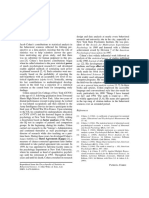Inclusive Education - What It Is
Uploaded by
mihaelahristeaInclusive Education - What It Is
Uploaded by
mihaelahristeaWhat are the affects of inclusive education?
In this aspect, the educational integration affects the rehabilitation and training of
persons with special needs, in difficulty psychometric, intellect, language, psychobehavioral,
sensory evaluation by a series of legal nature, political, social, pedagogical. In the
contemporary pedagogy an intense concern is to find the best ways and means of educational
intervention, since the young ages, as well as on a wider categories of the infant population.
Thus, the consciousness of children from an early age, must be formed and developed,
reprimanding them as the receipt of ,,different" children along with everyone else, this must
be made not for their sakes, in the first place, and not out of pity for them, but for each
individual to participate in joint actions for the development of the future, in order to
contribute in the development of the community in which he lives.
The argument of this report is just the idea that the inclusion can and is more than just
a demagogic speech, declaratory nature; it can be put into practice through concrete
techniques of teaching and personalized curricular adaptation, through the formation and
development of the awareness of all the children for diversitar acceptance of any type. The
kindergarten is aimed at creating a coherent program and coordinated by the inclusion of
preschoolers children with different disabilities, other ethnic groups, social origin, etc. and
prepare the other children with a view to acceptance thereof, without any differences in the
manifestation behavioral or verbal. Also, it is necessary to add implementation of coherent
strategies for the development of awareness and of the behaviors of children in a spirit of
tolerance and non-discrimination, the acceptance of the equal opportunities for all children.
The integration/ inclusion may be supported by the existence of a legislative
framework flexible and realistic, the interest and the availability of the teachers from mass
school and of the special school, the approval and support of the parents of integrate children,
the involvement of the entire civil societies, but also on the level of the relations which are
formed and develop at the level of the class integrators which are based on tolerance and
respect for the child with problems. The kindergarten which receives in the organization the
disadvantaged childrens shall determine ,,directly and indirectly" the attitude toward them is
composed of: educators, parents, children and externally, company with numerous media
institutions and various factors. An essential condition for the success of the joint action of the
three factors active in the kindergarten is the existence of constructive relations of
understanding, which is carried out through the open attitude, through the availability, through
a specific positivity, which is consolidated with willpower and conviction.
The teacher must be familiar with the deficiencies of children who will be received in
the group in the purpose of understanding and in order to shape the activities, according to
the needs of children.
When it comes to receiving a child with special educational needs, the attitude towards
him/her must keep a normal appearance, the child being treated like the other children in the
group. It is very important to increase awareness of children and their preparation to receive
in their rows a colleague with disabilities. Sensitization is done by incentives: the
development and implementation of games which allow the stimulation of shortcomings
(motor function, visual, aural), which causes the children to better understand the situation of
those who have disabilities, through the stories, literary texts, through open discussion,
visiting visually impaired persons.
What is the role of the kindergarten?
The kindergarten has the role to support the families and have confidence in their own
resources to cope with weights which they encounter. The education of the parents and
counseling have an important role to play in the integration of children with mental disorders
of emotional nature, or of any other nature in the kindergarten. The results of their work for
the promotion of inclusion, both direct and indirect, the educational partners, parents, appear
after long intervals and are the effect of a exercise diligently, supported. Educational center of
attention on the vulnerable groups is an indication of the level of civilization reached a certain
company and this necessitates the search for a new formula of human solidarity, which has a
special significance in our society.
The kindergarten is inclusive through a flexible curriculum and openly allowing
successive adaptations. No child follows the curriculum, but it is an instrument designed to
support the development of him,it shall be adapted to the needs and special features. There are
also certain risk situations in which the teacher must know the child's feelings and behavior,
in order to support him. The risks may arise from the sociocultural environment of which it is
part of a family relationship, which causes it to the day-to-day existence, as well as the
development of formal educational models which may exercise stress on the child which does
not correspond to the normality we are used to.
A planning must not start from the content but from the personalities of the children
from individual characteristics and features. On the other hand, the kindergarten, as an
institution, may not meet the requirements of a single multiple effective program of education.
There is a need for a partnership between the kindergarten- family- community, a common
construction for the benefit of the child, without prejudices, based on mutual respect,
acceptance, tolerance, regardless of the economic situation of social, educational or of their
parents. The teacher, in turn, must respond to the diversity and uniqueness of every child, to
aim the positive attitude, language and teaching methods. Preschool child is in a process of
training in which every gesture, every word, every glance at the adults who around him may
influence the image itself. .
The teacher's attitude to the child's actions, appeals, positive or negative appreciation
is
very important to give the child confidence in his own.
In order to assess the child, the teacher must take into account the competence and
educational capacities of each child and identify:
• how is each;
• what each knows;
• what each makes;
• how shall cooperate with the others.
For the approach of quality education in the kindergarten the inclusive teacher , must
comply with the following steps:
- to draw up a development plan for the kindergarten in which to specify concrete the
partnership with the family and community;
- the entire staff of the kindergarten to be prepared to receive all children, without
discrimination;
- to ensure a climate welcoming and opened by organizing the educational environment as
efficiently and paced;
- have discussions, in advance, with the children to accept some others, to collaborate and to
work together;
- to ensure a flexible curriculum and the parents to have acces on it;
- assess each child by direct and indirect observation in order to ensure adequate's
participation in the activities of the curriculare;
- to ensure access for all children from kindergarten program, but also in the amendments and
adjustments thereto;
- with a view to ensuring participation of all the families into the decisions and actions in
favor of all children;
- to evaluate permanently and periodically the progress made by all children, not only from
the point of view of intellectual procurement, but also from social relations, cooperation and
collaboration, self-image development and self-confidence;
- to develop individualized plans that are tailored for children who need support in some parts
of the development and at certain moments;
- to adjust continuously the curriculum in order to adapt it to the educational needs of
children;
- to achieve a permanent exchange of ideas, experiences and solutions with other
underclassman from kindergarten or other institutions, as well as their families with children.
You might also like
- Past Perfect Tense & Past Perfect Continuous0% (1)Past Perfect Tense & Past Perfect Continuous4 pages
- Review How Philosophical Contributions of John Dewey Could Be Used For EducationNo ratings yetReview How Philosophical Contributions of John Dewey Could Be Used For Education2 pages
- Examining The Centralized and Non-CentraNo ratings yetExamining The Centralized and Non-Centra12 pages
- Social Oriented Curriculum For Social Reconstruction100% (2)Social Oriented Curriculum For Social Reconstruction12 pages
- Summary, Conclusions, Educational Implications and Suggestions For Further ResearchNo ratings yetSummary, Conclusions, Educational Implications and Suggestions For Further Research19 pages
- Unit # Unit # 4 & 5 Sources of Knowledge, Greek Philosophers' Perspective On EducationNo ratings yetUnit # Unit # 4 & 5 Sources of Knowledge, Greek Philosophers' Perspective On Education44 pages
- Concept & Historical Backgroundunit-1 3003No ratings yetConcept & Historical Backgroundunit-1 30039 pages
- A Study On Instructional Supervision by Principals in Type 1c and Type 2 Schools in Sri LankaNo ratings yetA Study On Instructional Supervision by Principals in Type 1c and Type 2 Schools in Sri Lanka17 pages
- ES331 - 2 Considerations For Curriculum Planning PDF100% (3)ES331 - 2 Considerations For Curriculum Planning PDF14 pages
- Academic Discipline Design Under Subject DesignNo ratings yetAcademic Discipline Design Under Subject Design2 pages
- The Importance of Guidance & Counselling in A Student's LifeNo ratings yetThe Importance of Guidance & Counselling in A Student's Life9 pages
- Rashtriya Madhyamik Shiksha Abhiyan (RMSA)No ratings yetRashtriya Madhyamik Shiksha Abhiyan (RMSA)6 pages
- In - Service Teacher Education Under: Aroob ParweenNo ratings yetIn - Service Teacher Education Under: Aroob Parween16 pages
- Ganpat Vidyalay: Pre-Primary/Primary/A M Patel Sec/Hi-Sec (Sci/Com)No ratings yetGanpat Vidyalay: Pre-Primary/Primary/A M Patel Sec/Hi-Sec (Sci/Com)4 pages
- Thorndike's Trial and Error Theory - Learning - PsychologyNo ratings yetThorndike's Trial and Error Theory - Learning - Psychology35 pages
- Quality Assurance Practices of Private Secondary School Administrators On School Efficacy - Authored By: John Erick F. Cauzon100% (1)Quality Assurance Practices of Private Secondary School Administrators On School Efficacy - Authored By: John Erick F. Cauzon50 pages
- Content: National Plan of Action For Children 2005 Integrated Child Development Services (Icds) SchemeNo ratings yetContent: National Plan of Action For Children 2005 Integrated Child Development Services (Icds) Scheme21 pages
- Progressive Education In Nepal: The Community Is the CurriculumFrom EverandProgressive Education In Nepal: The Community Is the CurriculumNo ratings yet
- CST Students with Disabilities: New York State Teacher CertificationFrom EverandCST Students with Disabilities: New York State Teacher Certification5/5 (1)
- In The Kindergarten Inclusive Education: AbstractNo ratings yetIn The Kindergarten Inclusive Education: Abstract4 pages
- Supporting and Monitoring Student WelfareNo ratings yetSupporting and Monitoring Student Welfare11 pages
- Chi Kung - The Golden Elixir: 1. Definiti Si Aratati Semnificatia Notiunii de NectarNo ratings yetChi Kung - The Golden Elixir: 1. Definiti Si Aratati Semnificatia Notiunii de Nectar2 pages
- Asus ROG Zephyrus S GX531: 1.what Are The Main Characteristics?No ratings yetAsus ROG Zephyrus S GX531: 1.what Are The Main Characteristics?3 pages
- Peace: Gerard Manley Hopkins, 1844 - 1889No ratings yetPeace: Gerard Manley Hopkins, 1844 - 18891 page
- Pretul Unitar A) Material B) Manopera C) Utilaj D) Transport Total: A+b+c+dNo ratings yetPretul Unitar A) Material B) Manopera C) Utilaj D) Transport Total: A+b+c+d2 pages
- Introduction To Philosophical Perspectives of The Self (Includes Socrates & Plato)No ratings yetIntroduction To Philosophical Perspectives of The Self (Includes Socrates & Plato)29 pages
- Synopsis: Architecture As Transition: Creating Sacred SpaceNo ratings yetSynopsis: Architecture As Transition: Creating Sacred Space4 pages
- Emotional Intelligence - 2 Books in 1 - Emotional Intelligence EQ & How To Analyze PeopleNo ratings yetEmotional Intelligence - 2 Books in 1 - Emotional Intelligence EQ & How To Analyze People287 pages
- Theories of Instructional Management: PISMP 5.08No ratings yetTheories of Instructional Management: PISMP 5.0835 pages
- B7a93summer Internship Guidelines For B.tech (2011-15), B.tech Dual Degree (2011-16), B.tech. Eve (2011-15) & M.tech. (2013-15 ALL BRANCHES)No ratings yetB7a93summer Internship Guidelines For B.tech (2011-15), B.tech Dual Degree (2011-16), B.tech. Eve (2011-15) & M.tech. (2013-15 ALL BRANCHES)29 pages
- SAGX031 Lecture 3 Adult and Non Formal EducationNo ratings yetSAGX031 Lecture 3 Adult and Non Formal Education14 pages
- Is Age An Important Factor in Relationships?No ratings yetIs Age An Important Factor in Relationships?1 page
- The Developmental Stages of The LearnerNo ratings yetThe Developmental Stages of The Learner56 pages
- Natural Language Processing State of The Art CurreNo ratings yetNatural Language Processing State of The Art Curre26 pages
- The Clinical Implications of Jung's Concept of SensitivenessNo ratings yetThe Clinical Implications of Jung's Concept of Sensitiveness35 pages







